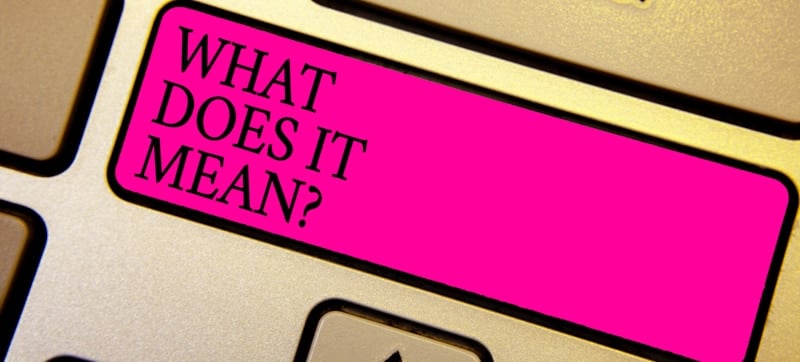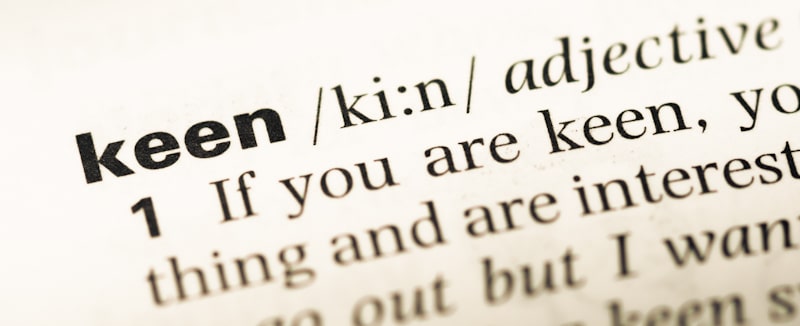There are formal terms in the English language, and then there are slang terms. However, some words or phrases are neither purely formal nor completely slang – and sit somewhere in the middle. When using the word “keen” in your writing, make sure it conforms to the style of your writing.
To correctly use the word “keen” in a sentence, incorporate the word to describe the intensity, interest, or sharpness (literally) of a subject. Also, the word should be used in tandem with specific prepositions; or words such as “to”, “on”, “in”, “for”, etc. should be used right after the word.
Read on to know more about the adjective’s meaning and origin, usage in various writing scenarios, example sentences with the word, etc.
Keen – Definition

The adjective “keen” is generally used to describe a thing or individual that’s sharp, intense, or focused. People who are “keen” on a certain thing basically are greatly interested in that thing and enjoy doing it. “Keenly (adverb)” and “keenness (noun)” are words derived from the adjective.
A few synonyms for the word include:
- eager
- piercing
- acute
- penetrating
- discerning
- fervent
- biting
- caustic
The word and the above synonyms are usually used to describe the:
- mind
- intellect
- eye
- sense
- desire
“Keen” could also be used to denote the superlativeness of an event, situation, or something or someone in a cool and fun way. In other words, the adjective could be used as an “intensifier”.
Despite the otherwise positive connotation, there could be a tad bit of sarcasm looming over the word when used to effusively praise a certain thing or person.
Brief History
The adjective has been in use since the 900s. It is based on “cene”, an Old English word, and is related to “kœnn”, an Old Norse term. The word “cene” translates as “bold and brave”. The spelling of “keen” and “cene” are different, but they sound pretty much alike.
Old Norse, also called Old Scandinavian or Old Nordic, was a North Germanic language. It was spoken by Scandinavia inhabitants and their settlements overseas from around the 7th century and up to the 15th century.
Besides Old Norse, the word “keen” is used to denote “strong” and “bold” in other languages such as Dutch and German. The word means “sharp”, in relation to a blade or an edge, only in English.
How to Properly Use “Keen” in a Sentence
The adjective “keen” could be used in multiple ways. It is, however, mostly used to describe intensity, enthusiasm, or sharpness (literally or figuratively). “A keen blade” or “a keen knife”, for instance, literally means a sharp blade or a finely sharpened razor that pierces or cuts substances readily. Here is an example sentence using the phrase:
- She wanted to use my keen knife.
When the term is used to refer to something sharp, it’s usually a knife (literal) or the human mind (figurative). Here are a few examples of using the word figuratively:
- A keen olfactory sense is one that is extremely strong and perceptive.
- A keen intellect or mind is one that is mentally strong and sharp.
- A keen desire or yearning is filled with intensity.
- A keen wind and keen satire are both biting and piercing.
The word can also be used to elucidate the alacrity with which certain things work. For example, the phrases “keen ears” or “keen eyes” mean the specific organs are particularly responsive or sensitive. “A keen mind” or “keen reasoning” indicates exhibiting or having great mental penetration.
“Keen” as a Slang Term
The phrases “keen on”, “be into”, and “interested in” are all different sets of words that mean pretty much the same thing. The phrase “interested in” is the most formal of the three and invariably used in academic and business texts. “Be into” is the least formal phrase, or proper slang. “Keen on” lies between the two.
When used in conjunction with another word, however, “keen” may become increasingly slangy. The phrase “peachy keen”, for instance, is informal.

The “peachy keen” phrase is used to refer to a thing as wonderful or excellent in a playful and informal manner. The phrase “peachy keen” could be used with or without the hyphen. The word “peachy” could also be used to denote the same thing.
The phrase “peachy keen” is not exactly recent or commonly used. It, in fact, is viewed as a slightly outdated phrase. The word “peachy” is used instead when the writer intends to mean the same thing as the phrase.
Due to its datedness, the phrase is typically used when the writer intends the sentence or message to come across as a bit cute or silly. And due to the overly cheerful or optimistic sound to it, the phrase could be used in a slightly sarcastic way at times. For example:
- My meetings ran beyond scheduled timings and I had a flat tire, but my day sure was simply peachy-keen.
The word “peachy”, which means an attractive or especially likable person, could be used earnestly, however. But even the lone adjective might be intertwined with sarcasm on certain occasions.
The adjective “keen” has been around since the 900s, as mentioned earlier. It was, however, used as a slang term only during the 1900s, a millennium later. Similarly, the word “peach” is a slang term that has been used in the US since the 1700s, at least. The first recorded usage of “peachy keen”, however, was during the 1950s.
Prepositions to Use After “Keen”
The adjective “keen” could be followed by a noun or a preposition. The prepositions that typically follow the word are (in descending order of usage):
- on
- for
- to
- in
- about
- at
- of
The preposition “on” is the most commonly used. Here are a few sentences incorporating “keen on”:
- But she wasn’t too keen on the plan.
- Are you keen on writing about consumer technology? Keep reading.
- Our six-year-old daughter wasn’t too keen on swimming as the pool was a bit too deep for her.
- I was never keen on attending that university, as I wasn’t a fan of the way the courses worked there.
- After my brief interaction with Jim, I quickly realized he wasn’t very keen on the project.
Here are some sentences using a few other prepositions with the word “keen”:
- He seemed a bit too keen for the project.
- The car’s engine is quite keen to rev.
- She isn’t very keen in certain ways.
- And I was not feeling very keen about that.
Kindly note, the prepositions in the above sentences are interchangeable, to a certain extent.
There are, of course, some differences between the prepositions. The words “on” and “to”, for instance, could denote certain minor, yet important variations.
- She is extremely keen on cooking.
- She is extremely keen to cook today.
In the first sentence, the preposition “on” denotes in general terms the subject’s interest in cooking. In the second sentence, however, the word “to” indicates the subject is stoked about cooking on the given day. The person may be keen on cooking in general or she is just feeling like cooking on that particular day alone.
Example Sentences with the Word “Keen”
Here is a wide range of sentences incorporating the word “keen”:
- She was a self-reliant, silent woman – with thin lips, a keen eye, and a professional demeanor.
- I ain’t keen either way.
- He was standing outside all by himself, watching things with keen interest.
- Mark gave her a keen glance.
- I’m keen to eat some pizza tonight.
- She was keen to know how he was doing.
- He was a keen hunter and a solid horseman.
- These last articles exhibit a keen analysis and solid interpretation of facts.
- Despite being extremely close, they wanted their privacy, and distance was particularly needed with that keen hearing ability of theirs.
- The malls are quite nearby for keen shoppers.
- Not all agriculturists are keen traders.
- They still rehearse two times a week and are more than just keen to widen their horizons.
- He was a good handyman and also a keen musician.
- I am not very keen on that topic.
- All the kids were keen to swim.
- They aren’t very keen on using the term to describe the dominant pair of the pack.
- That doesn’t bode well for the leader, who is keen on ruling the country indefinitely.
- They’ve been on a couple of dates together, and Amanda seems really keen.
- Anna is very keen on Tom.
Conclusion

If you are keen on something, it means you are excited about that thing and you cannot wait. On the other hand, if you are not keen on a thing, it denotes you are not enthusiastic about it or interested in it.
It should not be that difficult to get the meaning of the adjective right. However, as mentioned above, there are instances when the word could be used in the literal sense. Make sure you are able to make that distinction in meaning when framing sentences using the word.
Kindly note, “keen” is not very frequently used in the United States. It’s an adjective more popular in the UK and Australia than in America. If you are looking to specifically cater to English speakers of certain geographies, be particularly wary of this aspect.
Shawn Manaher is the founder and CEO of The Content Authority. He’s one part content manager, one part writing ninja organizer, and two parts leader of top content creators. You don’t even want to know what he calls pancakes.

